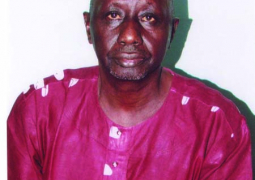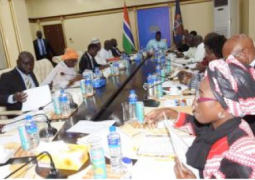“Journalism
in The Gambia during our time was a big challenge; it was very tiring and
hectic but we never relent,” said veteran journalist Ba Trawally who
established his newspaper in 1961.
His
paper, ‘New Gambia’, was among the first acclaimed independent newspapers in
The Gambia.
Mr
Trawally, born in 1931 in Barthurst, said at the time he started his newspaper,
independent journalism was “a very big challenge” in The Gambia as journalists
were jailed and castigated several times for their profession.
“But
people like me never relent,” he said, adding that because of his strict
adherence to professional journalism tenets, in spite of unfriendly
environment, there was a time in Banjul people pointed at him, saying “that’s
the man”, with great respect and honour.
The
veteran journalist said the first republic of The Gambia had not been all that
tolerant to the media but the second republic was the worse.
He
said the present government should accommodate journalists, particularly
publishers and staff of the private newspapers.
“The
government should encourage them, promote them, and do business with them,” he
said. “But also the old generation of
journalists like Cherno Jallow, Njang Thomas, myself and others should be given
the respect and honour we deserve.”
The
season journalist has a piece of advice for the young ones: “Make the best of your time and one way of
doing that is by educating yourselves; you must seek knowledge. Read books, not only newspapers, but books of
different styles of presentation.”
Meanwhile,
at the celebration of the National Journalism Awards Night, organised by the
Gambia Press Union as part of the commemoration of World Press Freedom Day,
Cherno Jallow, Nyang Thomas, and Mr Trawally, himself, were awarded in
recognition of the roles they played in the development of journalism in The
Gambia. A posthumous award was also
given to the family of George Christenson, the late proprietor of Radio One FM.
Like
Mr Trawally, Marcel Thomasi is another doyen of the Gambian media.
He
started broadcast journalism at Radio Gambia in 1970. He was the first Gambian journalist to
produce a manuscript of broadcasting in The Gambia and had covered government
and ministerial activities in the provinces.
“We
have gone through a long way in making what journalism is today,” he said. “We faced a lot of hardships and barriers but
we survived it.”
On
the comparison of journalism then and now, Mr Thomasi said: “There is absolutely a vast difference
between journalism before and now due to the advancement of technology. We had to struggle hard for news; our news
had to be scripted and taped which was very laborious because there were few or
no computers at that time.”
He
said despite the challenges, they pushed on because journalists have a
responsibility to the society as the society depends on the media for reliable
information.
Samba
Faal, a senior lecturer at the University of The Gambia School of Journalism
and Digital Media, said during the first regime, newspapers struggled
economically due to lack of readership.
But
in the second regime, he said, there were quite a lot of newspapers but they
were repressed because of obnoxious laws.
“So
what this government needs to do is to formalise its promise of freedom of the
press by amending the bad media laws,” he said.
However,
he advised that the present breed of journalists have to be professional and
responsible because press freedom comes with responsibility.
Read Other Articles In Article (Archive)



